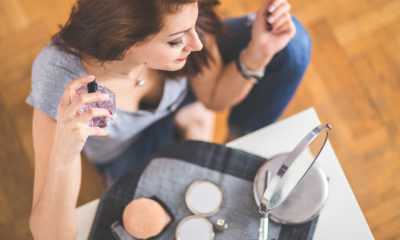
Current Events
What’s Happening in New York Now That Cannabis is Legal?
New York’s new Gov. Kathy Hochul is hyping the coming cannabis boom in the state — although no adult-use licenses have yet been issued. Meanwhile, the police in Gotham City are turning a blind eye to small outfits that are setting up tables in the parks and on the sidewalks, selling edibles, extracts and bud. How long will this utopian free-for-all last?
“Free samples! Edibles! Check it out,” the young entrepreneur who goes by the moniker “AI” yells in between tokes on a joint slathered with budder. Then, she adds, under her breath, “I’m high as f*ck!”
This is a Friday night in Washington Square Park, a key youth gathering point in New York City’s Greenwich Village, and business is brisk.
‘Open Market’ in Washington Square
AI says her initials stand for An Inspiration, and her business, registered in New York state last year, is Canaremedy — offering its own line of infused edibles, topicals and oils. At the table she has set up, she is also offering little baggies of bud, and pre-rolled joints.
Those inquiring about free samples are encouraged to help themselves to a little paper cup of AI’s “weed juice” — AI’s own concoction featuring a THC tincture. For the other products, money is exchanged, but technically, AI says she is accepting donations for free samples, rather than making sales.
It may seem a semantic distinction, but the since the passage of New York’s Marijuana Taxation & Regulation ACT (MRTA) in March, there is an “open market” in the state. Even if authorities officially do not view it that way, it is clear that the police are taking a hands-off approach. Several other tables peddling similar wares are set up nearby. The cops clustered around the square’s iconic arch, some 50 yards away, do not interfere. And this scene has been unfolding every night all summer long, and now into early fall.
AI’s goal is to eventually get a storefront, and a share of the licensed market. She registered the Canaremedy brand in 2020, in anticipation of legalization. Born in Newark and once homeless on the streets of New York, she’s now an East Village resident.
She explains that she got into developing her own cannabis products because her sister is suffering from multiple sclerosis, and her ailing mother suffered from a skin condition. “I felt the need to help my family — both with financial support and medicine.” Her first creation was a CBD “body butter” that aided her mother’s condition.
“My mission is to create a business to help people and the community — mind, body and soul.” And also, she adds, to finance her ambitions as a writer, rapper, artist and musician. She is currently working on a semi-autobiographical book, Love A Lesbian.
Local Neighborhood Business
“Trademark Rob” has over the past several weeks maintained a similar table, this one on the sidewalk of Clinton Street on Manhattan’s Lower East Side. “I was born and raised on Clinton Street,” he says proudly as he breaks up bud to roll a joint on the curbside. “Clinton is on my birth certificate.”
The baseball cap he wears backwards, New York style, shows the official logo of the city, in the official font — “NYC.” But it is adorned with a cannabis leaf image and the letters below read “New York Cannabis.”
Trademark launched his tongue-in-cheek brand a year ago as an apparel line, with the anticipation of cannabis going legal in New York state. After months of selling hoodies, caps and t-shirts emblazoned with the New York Cannabis logo from a storefront at 40 Clinton, on April 1 (the day after MRTA was signed) he started offering cannabis officially, as a promotional give away with an apparel sale. He set up the sidewalk stand in September, when the storefront was temporarily closed for renovations.
At the stand, Trademark and his crew offer a sealed baggie of bud (3.5 grams) with a purchase of $100 worth of merchandise. “We call that an eighth on the street,” Trademark says wryly.

Waiting to get back into the storefront after the landlord completes renovation, Trademark says being on the street has increased awareness and visibility. “People were thinking we were just an apparel store.”
There has been no problem with law enforcement whatsoever, according to Trademark. He’s openly sold bud and edibles from his table. “The cops are more concerned with vehicles parked in the bike lane,” he quips.
“It all unfolded organically for me,” Trademark says. “We’ll apply for a retail license when it’s available. We want to offer educational courses for those new to the cannabis biz, and a members-only consumption lounge. Maybe a smoke and paint, instead of a sip-and-paint.”
A list of available varieties displayed at the table names San Fernando Valley OG, Glookies (Gorilla Glue X Girl Scout Cookies), Cake Batter, Kasmeir, East Coast Sour Diesel and Fruity Pebbles.
Trademark says all the product is New York state indoor, and much of it grown within the city. He says whole buildings in the city are now dedicated to cannabis cultivation, exploiting the six plants per adult resident allowed under MRTA. Although technically, this provision does not take effect for several months.
Delayed Licensing Process
This same strategy of conforming to the letter of the law by the narrowest of margins is also being pursued by the city’s CBD stores, which are openly selling very potent Delta-8 products. Since passage of the 2018 U.S. Farm Bill, hemp-derived Delta-8 THC has been in a legal grayzone, as the law only refers to Delta-9 THC as a prohibited cannabinoid.
Mayor Bill de Blasio, for two years now, has instructed the NYPD to not make arrests for small cannabis offenses, and New York City’s district attorneys are no longer prosecuting such cases. However, this applies to use and possession rather than sale. And while arrests dropped dramatically under this policy, as recently as mere weeks before the passage of MRTA, there were still instances of brutal arrests for cannabis offenses.
Under MRTA, public use and possession by those over 21 are now legal, within the permitted limits: three ounces of bud or 24 grams of concentrate. But unlicensed cannabis sale is another matter and it not clear if the law treats the exchange of unlicensed cannabis from one hand to another any differently if no money is exchanged. The current laissez-faire atmosphere in the Big Apple appears to be a matter of policy rather than law.
Six months after the passage of MRTA, state authorities are only now starting the process of crafting the licensing and regulation structure for commercial cultivation, processing and sale. The first meeting of the new Cannabis Control Board was finally held on Oct. 5, in a virtual format, NewYorkUpstate reports. Political chaos in New York state (then-governor Andrew Cuomo stepped down under cloud of scandal five months after signing MRTA) contributed to delays in appointment of the five-member board.
“The MRTA was signed into law on March 31. But we were not able to begin the work of establishing New York’s cannabis market until Sept. 22, when the full cannabis control board was appointed. As such, there was a six-month delay to make up,” Christopher Alexander, executive director of the Office of Cannabis Management, told the board as the meeting opened, according to LoHud.
And the only immediate changes to come out of this first meeting concerned the state’s very limited medical marijuana program. Board members agreed to permanently waive the $50 registration fee for patients and caregivers and to make actual herbaceous cannabis an approved form of medical marijuana product.
Empire State Canna-Boom?
A coming cannabis boom was hyped by Gov. Kathy Hochul at the Business Council of New York State’s annual meeting on Sept. 24. “We do want to go big or go home, and I want to help you get there,” she said. “I need you to survive because you’re the identity of New York that people create jobs and opportunities. You are who we are as New Yorkers. Your success means the success of this entire state,” Hochul affirmed.
“So count me in as an ally — someone who’s going to be there for you, who will fight for you to make sure that we do not lose out to any competition, whether it’s in the space of cannabis, where I believe there’s thousands and thousands of jobs and new industries, to be created.”
The Business Council meeting, held “in real life” at Rockefeller Center’s posh Rainbow Room, brought out several bigwigs of finance, industry and celebrity, including Bronx native and retired NFL player Ruben Lindo, who is now CEO of Phoenix Nutraceutical and founder of Buffalo-based Blak Mar Farms. Lindo applauded the state’s commitment to award cannabis business licenses to neighborhoods impacted by cannabis prohibition under MRTA’s social equity provisions. But he urged that those who have already been in the industry deserve more than a carved-out allocation of permits, according to MarketWatch.
“It’s about giving the rightful ownership of an industry to people who bore the brunt of incarceration,” Lindo said. “We operated in the space at risk of life and liberty.”
Many of these legacy operators are already taking advantage of the post-MRTA euphoria and bureaucratic limbo to boogie in public. It remains to be seen whether this thriving informal sector will survive once the big boys start getting state licenses.

























